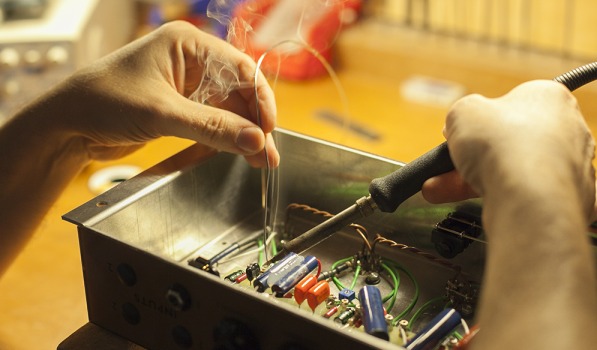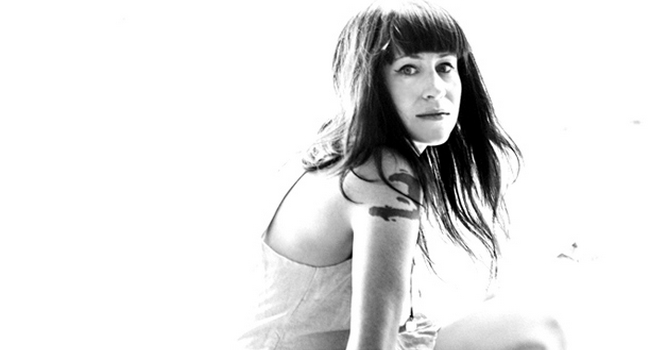On a sunny August Saturday in 2008, Austin quartet The Octopus Project provided a sonic highlight of that year’s Lollapalooza and a valuable lesson in concert-going etiquette. The band was wearing their usual uniforms: Yvonne Lambert behind the keyboards (and theremin, glockenspiel and sampler) in one of her trademark ’60s patterned cocktail dresses and her husband, Josh Lambert, guitar, Ryan Figg, bass, and Toto Miranda, drums, were clad in their white shirts, black pants and black ties.
Not only did they pass out tubular balloons that made the midday sunbake seem more like a petri dish growing bacteria than a Grant Park athletic field, but they taught their audience how to respond when a band yells some variation on “How’s everybody doing?” Mr. Lambert taught those there on that day to say, “Fantastic, thanks for asking!” After a few rehearsals, the attendees had it down pat.
At the time, The Octopus Project had released their third album, Hello Avalanche. Five years later and shortly after the release of their new long-player, Fever Forms, Josh Lambert still stands behind that advice, although he has to be reminded of that precise language. He can be forgiven for not remembering that bit of witty stage banter, as when he’s reached by phone, he’s “thinking about seven things at once,” including paying tolls. Speaking from their tour van, somewhere between shows in DC and Boston, Lambert talks about their goal with the new record, the life of a professional musician and what the next project will look and sound like for The Octopus Project. Not until the end does he reveal that he’s actually been driving their van the whole time, which would be one of the “seven things” he’s been thinking about, no doubt.
When touring, the foursome take turns driving the van, and whoever drives on that particular leg gets to pick the music to play. Lambert says when they composed and recorded their previous record, Hexadecagon, they were listening to “more ambient, meditative stuff in the van and [with] super long drives we played super long songs or records” and that became a big influence.
“Lately we’re listening to a lot podcasts,” he says. “We’re all going to be podcasters on the next record, it’s going to be a bunch of talking.” Lambert admits that might be boring but he gets a kick out of the idea nonetheless.
It’s a challenge to describe the sound of The Octopus Project, apart from applying the rather vague but entirely accurate sobriquet “wildly creative.” Their sound is busy to a fault, energetic to the extreme, and although they integrate a heavy backbone of electronics, they are a guitar-based rock band, too. In contrast to the beautiful but leisurely and minimal Hexadecagon, Fever Forms rocks out quite a bit more, and has a much denser sound.
“[The songs on Hexadecagon] take you to a more internal, heady kind of place, and Fever Forms is much more of a rock out, intense experience,” Lambert says. “We were trying to go towards more what our live shows are like, kind of everything all at once and in-your-face.”
Indeed, Hexadecagon sounded more organic and spare, whereas the new record sounds more electronic and, well, maximal. Fever Forms sounds like there are a lot of elements working together at every single moment—the last record would add on elements and build up layers gradually.
Although all four members switch their instruments around liberally during their live show, it’s still hard to believe that The Octopus Project is only a quartet, given the dense sound the members create.
“We clone ourselves only for the tour, have eight or nine people [on stage] and murder our clones after every show, and make more for the next show so we don’t have so many people in the van,” Lambert says. “We get sad every night, because you can grow to love your other-self after awhile, but you only have a couple of hours with them, so it’s not that bad.”
Lambert is joking, of course, and although he finds the notion of his band being “ghettoized” as “instrumental” highly amusing, he seriously dislikes The Octopus Project being categorized as a particular genre of music.
“I kind of super-hate being shoved into the “instrumental band” [category] and compartmentalizing is pretty frustrating, and I don’t feel like we ever really stick to one thing,” he says. “It drives me nuts to be labeled post-rock or EDM or whatever the phrase of the moment is. It’s just annoying, so that drives us to try something new every time.”
The Octopus Project normally come up with new material by bringing a sound or an idea to a song to other members of the group and they exchange the ideas and song constructions.
“A lot of times it’s just us working alone on something and then passing it to somebody else and then the songs will get built up that way. Pretty rarely does anything happen with us all in a room jamming up something,” he explains. “Our jams usually sound like Guns N’ Roses or something, so those tend to not make it onto the record.”
Both Lambert and Toto Miranda were film majors, so not only has the band been influenced by film concepts, but they integrate films into their live shows, and they love making videos too. The single for “Whitby” included a karaoke version (the Lamberts love karaoke and have their own machine at home), and the super-deluxe version of Fever Forms came with buttons, a T-shirt and a custom made 3-D View Master.
Aside from touring to promote Fever Forms, The Octopus Project are working on a film soundtrack for the Zellner Brothers, with whom they had previously collaborated on music videos and the soundtrack to the movie “Kid Thing.” The forthcoming movie is called “Kumiko” and it’s based on true story about a girl from Japan who was obsessed with the Coen Brothers’ movie “Fargo” and decides to go find the fictional treasure that is featured in the film.
“It’s cool that we get to go to a totally other world of music; we’re super-obsessed with movie soundtracks,” Lambert says. “We are and [the Zellner Brothers] are, and we get to exercise these spirits that we don’t normally get to do outside the rock ‘n’ roll world.”
After their tour ends this fall, The Octopus Project plan on starting to write their next record when they get back home to Austin. For Lambert, the writing/recording/touring cycle, and the many multimedia bells and whistles that get thrown in when you’re The Octopus Project, are part of the only territory he’s known for most of his professional life. “It’s super hard and super fun, it’s what we all do all day long, every day. I love it, but it’s a lot of work,” Lambert says.
“We’re not sitting in lounge chairs, watching movies and drinking piña coladas all day long, but it’s always different, which is fun, and keeps it interesting. I wouldn’t be doing anything else at this moment in my life; it’s really fulfilling.”



